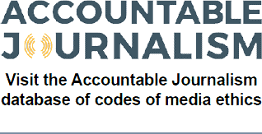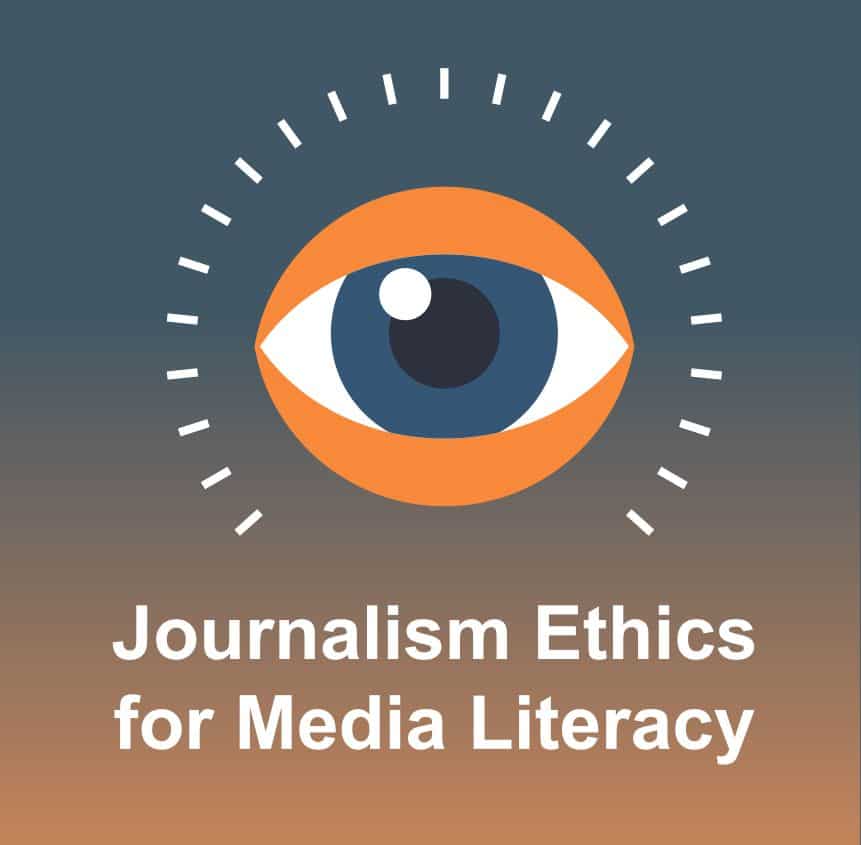Ethical Journalism: It’s Back in The News as we Fight for Quality and Democracy in the Digital Age
The Facebook Files published by the Guardian have lifted the lid on Facebook’s policies on hate speech, pornographic, abusive and violent content. This article, written by the EJN’s Director for UNESCO before the story broke on 21 May 2017, explores how ethical journalism can be an inspiration for free expression in the digital age.
Aidan White
Journalism is on the move like never before. Today the news business is faster, more pressurised, and infinitely more complex as media have learned the hard way how the information revolution, for all its liberating qualities is a two-edged sword.
While news media can deliver stories around the world in seconds and communications have the potential to build stronger, more informed and more engaged communities, the business models that paid for journalism in the past are broken and in many cases beyond repair.
With less money to pay for public interest journalism, newsrooms struggle to maintain their ethical base. Problems that have always been on the radar – political bias, undue corporate influence, stereotypes and conflicts of interest – are magnified.
The past 15 years has seen a dramatic decline in news journalism as technology has changed the way people communicate and the way the media business works. Today, most of us get our news through mobile telephones and from online platforms that have grown rich by exploiting people’s personal data and, at the same time, by draining lucrative advertising from traditional media.
Thousands of news outlets (mainly newspapers) have closed. Tens of thousands of journalists have lost their jobs. People’s access to reliable and trusted sources of news has narrowed as traditional news sources, particularly at local and regional level have contracted, even though the space for free speech has expanded dramatically.
The Ethical Journalism Network (EJN) was created just five years ago to strengthen journalism in the face of this crisis.
As a coalition of more than 60 groups of journalists, editors, press owners and media support groups the EJN promotes training and practical actions to strengthen ethics and governance. Its work, whether developing a test for journalists to expose hate speech, guidelines on reporting conflict or multi-country reports on migration reporting, resonates with journalists all around the world.

Because it has its roots within media the EJN’s multi-country reports and even those that lift the lid on the untold stories about the realities of how media work and the challenges of self-regulation have credibility inside journalism.

The EJN’s soundings in this period of uncertainty are that despite the increasingly hostile economic and political climate, journalists everywhere, from Turkey, Syria and Egypt to Pakistan, China and Indonesia, remain committed to truth-telling and ethics.
This commitment is a golden asset at a time of social transformation, when the global communications culture is in chaotic transition. To people inside media and anyone striving for the keys to safe and secure communications in future, the defence and promotion of ethical journalism has become more important than ever.
Fake news, political and corporate propaganda, and shameless online abuse threaten democracy and they open up new frontlines for free speech defenders, policymakers, and media professionals alike. A toxic mix of digital technology, unscrupulous politics and commercial exploitation of the new communications landscape are creating stress fractures across the wider landscape of public information.

With this in mind the EJN has promoted a new debate about the need to recognise why journalism, which is constrained by its framework of ethics, is essential for building public trust.
But there is no widespread yearning for a new code of ethics. The core values of accuracy, independence and responsible reporting which have evolved over the past 150 years remain as relevant as ever even in these digital times.
What is needed says the EJN is a new partnership with the media audience and with policymakers to persuade them that ethical journalism should be strengthened and that it can be used as an inspiration for new programmes to promote information literacy.

Today it’s not just journalists who need to watch their language and show respect for the facts; everyone with something to say in the public information sphere needs to show some ethical restraint.
The EJN argues that ethical values of journalism such as fact-based communications; humanity and respect for others; transparency and owning up to errors are cardinal principles which should guide everyone including social media users and citizen journalists. But this should be a voluntary process and not driven by law.
Nevertheless, some governments, even in democratic countries, are worried by online abuse and fake news. They threaten to fine technology companies that don’t act to remove malicious and dangerous information when it pops up on their platforms. This could limit legitimate dissent and free speech, but it is ever-more likely to happen unless these companies act to support ethical communications.
The problem is that the tech giants that dominate the public information space, such as Google, Facebook, Amazon and Twitter, circulate information in a value-free environment. They give no priority to information as a public good, such as professional journalism. For them journalism competes on an equal footing in their marketing with other information, even if it is malicious and abusive.
Using sophisticated algorithms and limitless databanks that provide access to millions of subscribers, this business model is driven by one simple objective – to encourage “viral information” that delivers enough clicks to trigger digital advertising. It matters not whether information is ethical, true or honest; what counts is whether it sensational, provocative, and stimulating enough to attract attention.
No matter how sophisticated they are, digital robots can’t be encoded with ethical and moral values. The best people to handle ethical questions are sentient human beings; well-trained, informed and responsible journalists and editors.
After recent scandals – outrage over censorship of iconic photographs, the live streaming of torture and murder, and major corporations complaining about their adverts being placed on websites preaching terrorism, hate and child abuse – the technology companies have promised to act. But will it be enough?
On May 4th 2017 Facebook boss Mark Zuckerberg promised to add an extra 3,000 to the company’s existing 4,500 employed as content reviewers following outrage over the broadcast of live murder and gang rape.
Given that Facebook has a subscriber base of almost 2 billion that means one content reviewer per 250,000 or so users. It’s a fraction of what is needed to monitor and control the growth of unethical, abusive content and the dangers posed by propaganda and fake news.
One simple answer would be for tech companies to accept their role as publishers in the digital age and to draw upon the vast pool of informed and ethical journalists currently displaced by the information revolution. And we know they can afford it. In early 2017 it was reported that Facebook was worth around $400 Billion and Google more than $600 Billion. These are among the world’s richest companies.
While policymakers and technology moguls wring their hands over these issues the use of technology by unscrupulous politicians to undermine democracy and to interfere in elections is growing. And fake news laced with malicious lies is all part of the strategy.
The crisis was highlighted earlier this year by Sir Tim Berners-Lee, inventor of the world-wide web, who warns that the online world is being overwhelmed by governments and digital corporations and that exploitation of people’s privacy is squeezing the life out of the Internet.
His criticism highlights the disruptive and pernicious threat posed by the marketing of false information in politics. He accuses online platforms of being unethical in the way they use sophisticated techniques to promote online political advertising that directs voters to fake news sites.
In an open letter (on March 12) he wrote:
“In the 2016 US election, as many as 50,000 variations of adverts were being served every single day on Facebook, a near-impossible situation to monitor. There are suggestions that some political adverts are being used in unethical ways – to point voters to fake news sites, for instance…. Is that democratic?”
It’s a good question and one that was also asked in France on the eve of the French presidential election in May 2017, when online hackers dumped thousands of confidential email files, many of them fake, concerning Emmanuel Macron, the eventual winner.
This information mountain couldn’t be examined, verified or debunked by journalists because French law forbids public discussion of election information in the last hours before people vote. But it circulated freely on social media.
With growing evidence of interference in democratic process, the debate over how to expose and eliminate fake news is certain to intensify, but the discussion is already confused by misunderstanding about the phenomenon, its origins and why it poses a threat in the first place. To try to illustrate the problem the EJN has developed a definition:
“Fake news: information deliberately fabricated and published with the intention to deceive and mislead others into believing falsehoods or doubting verifiable facts.”
Using this definition it is easier to separate propaganda, “alternative” facts, and malicious lies from journalism. News reporting can be rough and ready, but ethical journalism owns up to its errors and, more importantly, because it is fact-based and has civic purpose, it also provides a road-map for policy to build a safe and reliable public information space.
For more on Facebook and fake news read our Ethics in the News report.
Main image: iStock.com / amesy